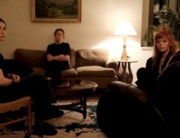Flash Gordon was a campy 1980 space opera that did not quite do well enough at the box office for a sequel. Eventually it fell into obscurity but managed to attain cult film status for the chosen few. Sam J. Jones played Flash Gordon with great enthusiasm, making up for his lack of skill in the acting department—and there is a significant lack of skill. Afterwards, he tooled around for a few years in failed TV shows and B-movies before disappearing almost completely.
Life After Flash is ostensibly about Jones and his post-Flash life, but mostly it celebrates Flash Gordon and its fans, some of whom are celebrities. There are plentiful interviews with major and minor players, including the absolutely irrepressible Brian Blessed and the ever arch, even in his late 80s, actor Peter Wyngarde, who also appeared in the film. (He died in 2018.) Together the group remembers fondly the troubled production and, just as fondly, Jones.
Meanwhile we meet Jones as he travels from to various comic cons in the United States and Europe as he waxes philosophical about his life. He is not very philosophic or, in fact, very exciting. He’s led an eventful life, but that has led him back to self-help platitudes and bible verses and a general idea that family means everything. Which is well and good, but he doesn’t examine his past in a deep, meaningful sort of way.
But what director Lisa Downs does so shrewdly is draw parallels between Flash, an average guy who saved the world through adversity and adventures, and Jones, an average guy who saved himself through adversity and adventures. Jones describes a rough childhood capped by the premature death of the older brother he worshipped. He joined the Marines before hitting Hollywood, young and cocky, starred in Flash Gordon, got even cockier, and eventually got slapped down by the Hollywood elite. After years of debauchery and cheating and neglecting his family, he hit rock bottom and found God. Now, he works in high-level personal security and travels to comic cons across the globe.
Everything circles back to Flash Gordon and the affection this disparate group of subjects feel toward the film. Along with the cast and crew, you also get sound bites from celebrities who were clearly corralled at the conventions that Jones was appearing: very intense memorabilia collectors, comedians, musicians, and, of course, Jones’s own family.
There is not an iota of negativity, condescension, or ill will toward anything or anyone involved. Life After Flash is a love letter to a forgotten film, the people that made it, the people that love it, and the man who embodied it.







Leave A Comment